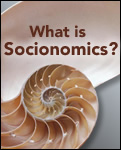Kevin Depew discusses the world of finances from a socionomic perspective. Socionomics is a theory about human social behavior.* – Ilene
Five Things You Need to Know: The Rush to Disassociate

Kevin Depew’s Five Things You Need to Know to stay ahead of the pack on Wall Street:
The Rush to Disassociate
The one thing we need to keep in mind about a crowd is that, inevitably, there will come a point when people choose to abandon it. This point is called the rush to disassociate, a phrase coined by Elias Canetti in his book, "Crowds and Power."
Canetti’s book is a fascinating anthropological meditation on crowds, how they operate, and how we are mostly powerless to escape their pull. Interestingly, a key attribute of crowd behavior is the inevitable rush to disassociate from it once it peaks; ironically, that attribute is itself the trigger for yet another herding impulse. As Canetti put it, once crowds peak, a rush to disassociate from the original crowd often fuels their ultimate disruption.
Through the lens of Socionomics we can observe the current rush to disassociate in terms of the dissolution of the crowds that were a consequence of peak positive social mood; crowds that perpetuated everything from the housing mania to the consumer boom and the worship, literally, all things finance.
Shifting Social Mood: A Process, Not An Event
Shifts in mood and crowd behavior do not happen overnight. The shifts we are seeing and experiencing now have been building for quite some time. In late 2007, economist Robert Frank published a book titled, “Falling Behind: How Rising Inequality Harms the Middle Class.” The book is an interesting critique of consumer behavior and makes the claim that increased concentrations of wealth at the top of the economic pyramid have set off “expenditure cascades” that raise the cost of achieving many basic goals for the middle class.
Naturally, the housing boom plays a large role in this critique, laying the groundwork for the increasing “rush to disassociate.” According to Frank, the choices made by families at the top of this pyramid to purchase larger and larger houses leads families in the middle to spend a greater percentage of their own income on housing, thus leaving less and less money left over for "important’ categories.  This is "relative consumption" of "positional goods," or goods that are valued in comparison to others.
This is "relative consumption" of "positional goods," or goods that are valued in comparison to others.
Fair enough. But it’s not as if Robert Frank just discovered income inequality and is choosing now to point it out to the rest of us. So why now? The answer lies in social mood. Remember, it is social mood that drives changes in social actions, not vice versa. Social mood, in the aggregate, is what lays the groundwork for "solving" the problem of income inequality.
This is not to say that at all times there won’t be someone concerned about income inequality, regardless of social mood. Rather, it suggests that social mood is what allows, say, a book that advocates taxing consumption and eliminating taxation on savings (as Frank’s does) to appeal to a broad audience.
From Thinking to Action
More recently, the “rush to disassociate” is taking on a more intense, action-oriented flavor, something that will be important to follow in the future as it carries with it a profound shift in the character of public attitudes toward wealth and consumption.

A recent Bloomberg News story chronicled the growing shift from worshipping the world of finance to despising it. The piece, “Feinberg Despised in Wisconsin Where Cerberus Lives Up to Name,” details a more aggressive wave of negative sentiment building toward billionaire Stephen Feinberg who founded Cerberus Capital Management, the firm that owns a variety of Wisconsin companies as well as Chrysler.
“This is a greedy, extremely greedy guy who doesn’t care about other human beings,” Jeffery Wyngard, a third-generation Kimberly mill worker who lost his job when Cerberus closed the mill, told Bloomberg. “Feinberg has no morals,” paper mill workers union local president Andy Nirschl added. “There won’t be a lot of Stephen Feinberg Little League fields,” Bob Brukardt, who also worked at the mill for 30 years, told the news service. “He sold his soul to the devil.”
The Coming Retribution
The article goes on to detail the “pent-up anger” toward financial firms in general, as well as the feeling among people that “they’re being screwed.” Tough language. But if 2008 was indeed only the beginning of a growing wave of anti-consumption sentiment, 2009 will usher in a darker, more direct confrontation against consumption and finance in general, as the crowds that perpetuated the boom dissolve and reformulate into different crowds seeking retribution and punishment for the perceived excesses of the past.
Later this week, in Five Themes You Need to Know for 2009, we’ll take a closer look at this process of retribution and what 2009 holds in store for us from a socionomic standpoint.
*******
*From Wikipedia: In 1979, [Robert] Prechter postulated that social mood drives financial, macroeconomic and political behavior, in contrast to the conventional notion that such events drive social mood. His description of social mood as the driver of cultural trends reached a national audience in a 1985 cover article in Barron’s. Prechter coined the term "socionomics" and in 1999 published an exposition of socionomic theory, The Wave Principle of Human Social Behavior.
Since then, the counter-intuitive premise of the socionomic hypothesis — that in contexts of uncertainty, endogenous processes (not exogenous causes) create patterns of social behavior — has gained attention in academic journals, books, the popular press, at academic conferences and in research funded by the National Science Foundation.


